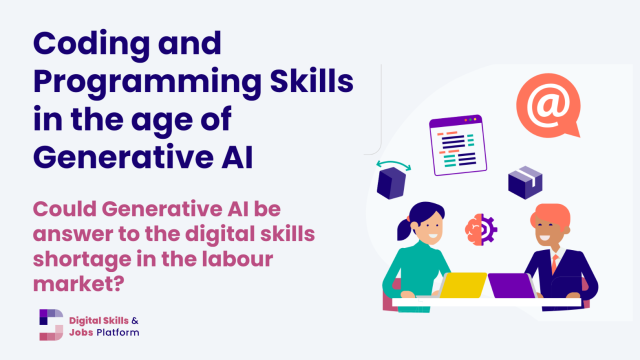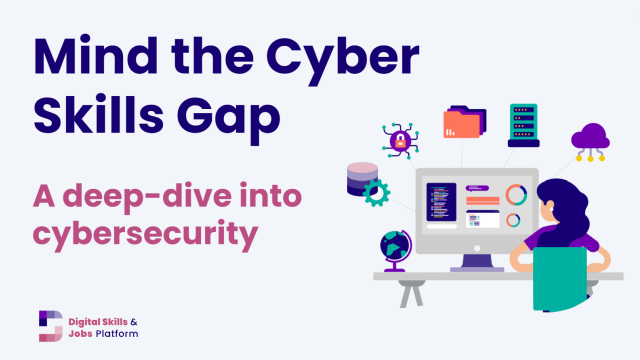Digital Experts: a deep-dive

The latest developments of several disruptive technologies like Artificial Intelligence, the Internet of Things and Big Data drastically alter work practices bringing a paradigm shift in the workplace. Currently in the EU and worldwide there is a shortage in highly skilled ICT professionals (digital experts). It is estimated that by 2030, the number of Information and Communication (ICT) professionals (digital experts) in the EU should rise to 20 million. The emergence, integration, and adoption of new digital technologies necessitates upskilling and reskilling of ICT experts. Towards supporting digital experts’ professional development, the current article proposes a four-stage process: identification of the skills shortages or gaps, development of the needed skills through formal and non-formal education, transfer skills into the job market and monitoring and evaluation of the effectiveness of this transition. The emphasis is on a skills development ecosystem that can involve a number of actors to provide several reskilling and upskilling pathways. EU is committed to the aim of reskilling and upskilling digital experts and supports various key initiatives for their continuous professional development. The Digital Decade policy programme, with concrete targets and objectives for 2030 defined in the Digital Compass: the European way for the Digital Decade programme “shapes the digital transformation of Europe’s society and economy, bringing benefits to everyone”.
Author’s biography
Stavros Α. Nikou is Lecturer in Digital Education at the Strathclyde Institute of Education, University of Strathclyde, Scotland, United Kingdom. He holds a Ph.D. in Information Systems, MSc in Computer Science and BSc in Physics. He leads the Postgraduate Certificate in Technology Enhanced Teaching and Learning (Digital Education) at the University of Strathclyde. His main research areas are learning technologies, smart learning environments and digital competencies. His work is published in international journals and refereed conference proceedings. He is Senior Fellow of the Higher Education Academy (SFHEA) and Senior member of IEEE (SMIEEE).
Digital transformation creates demand for new digital skills
The digital transformation, led by the latest technological developments, is bringing about a paradigm shift in the workplace. The “digital workplace transformation” is conceptualised as
"A phenomenon of new technologies causing significant changes to a variety of work-related aspects: changes to how employees carry out tasks and processes, as well as changes to their social relations within the organisations, and subsequently to their overall workplace experience” (Meske & Junglas, 2020, p.1120).
Indeed, the arrival of several disruptive technologies like Artificial Intelligence (AI), the Internet of Things (IoT), and Big Data, is already rapidly transforming organisation structures and work styles (Verhoef et al, 2021), and creates demand for new skills in all sectors worldwide. The World Economic Forum projected in its Future of Jobs Report 2023 (Zahidi, 2023) that 44% of workers’ core skills are expected to change in the next five years - and that half of the employees worldwide will need reskilling by 2025 due to the adoption of new technologies. Europe also faces a shortage of digital experts who can design and develop state-of-the-art digital technologies for society.
Technological developments and the introduction of transformative practices in various sectors where ICT is applicable (such as professional services and manufacturing), significantly influence the future skill demands for ICT professionals. The OECD (Organisation for Economic Cooperation and Development) defines ICT specialists “persons who have the ability to develop, operate and maintain ICT systems and for whom ICTs constitute the main part of their job” (OECD, 2014: Information Technology Outlook). According to ESCO, the European classification of Skills, Competences and Occupations, ICT professionals conduct research; plan, design, write, test, provide advice and improve information technology systems, hardware, software and related concepts for specific applications; develop associated documentation including principles, policies and procedures; and design, develop, control, maintain and support databases and other information systems to ensure optimal performance and data integrity and security. The rapid development and integration of new technologies has a significant impact on ICT professional roles, rendering some skills obsolete and increasing the importance of others.
Currently, over 70% of businesses report a lack of staff with adequate digital skills. In 2021, over 60% of EU businesses that hired or attempted to hire ICT specialists experienced difficulties in filling those positions. According to Eurostat, in 2022, around 9 million persons worked as Information and Communication (ICT) professionals (digital experts) across the European Union (EU), with 81.1 % of them men, and 18.9 % women. Over the last decade, the share of ICT specialists over the total EU workforce has been increasing in the EU. As Figure 1 below shows, in the 2022 the share was highest in Sweden (8.6%), followed by Luxembourg (7.7%) and Finland (7.6%) and the lowest shares were observed in Greece (2.5%), Romania (2.8%) and Poland (3.6%). It is estimated that by 2030, the number of Information and Communication (ICT) professionals (digital experts) should rise to 20 million. However, in a recent Monte Carlo simulation, Europe falls short of the Digital Decade’s target for ICT specialists with close to 7 million ICT experts (around 13 million instead of the projected 20 million) (EIT Digital 2021).

Figure1 - Towards 20 million ICT Professionals in EU by 2030
According to the European Commission, technologies that will face more challenges are Artificial Intelligence, Big Data, Cloud Computing, Cybersecurity, industrial biotechnologies, robotics and micro-electronics. A report from the European Software Skills Alliance (ESSA) states that the most needed hard skills for software professionals are programming skills (Java, Javascript and HTML followed by Python, C++ and C#) with algorithm skills and design skills ranking a bit further below. The existing skills gap necessitates reskilling and upskilling of ICT professionals, and closing it is a priority on regional, national, and European level alike.
State-of-the-art digital skills landscape
Assessing skills mismatch and shortages is the first step in defining an effective reskilling and upskilling strategy (OECD, 2016) to improve the level of digital skills for ICT professionals in Europe. The European e-Competence Framework (e-CF) provides a reference of 40 competences and proficiency levels as required for ICT professionals across Europe. The European ICT Profile Family tree, published by CEN (European Committee for Standardization), which is structured in seven families (Process Improvement, Business, Technical, Design, Development , Service & Operation and Support), generates a framework of 30 European ICT Professional Role Profiles which has been mapped to the SFIA skills. However, there is a number of technology adoption drivers that will affect the nature of these skills. The latest Future of Jobs Report (Zahidi, 2023) published by the World Economic Forum highlighted that Artificial Intelligence, Big Data and Cloud Computing will have the largest likelihood of adoption and therefore have the potential to act as the main drivers of change in the forthcoming years. Artificial Intelligence and Machine Learning Specialists, Business Intelligence Analysts, Data Analysts and Scientists, Networking and Internet of Things Engineers and Information Security Analysts will be the fastest growing jobs and roles in ICT, expected to reach the plateau of productivity in 10 to 15 years.
How is the emergence, integration, and adoption of new digital technologies changing the skills landscape for ICT experts? A closer look.
Artificial Intelligence and Machine Learning
Artificial Intelligence (AI) seems to be the most promising technology: it can automate complex processes and improve the accuracy and the speed of data analysis capabilities in a variety of applications (Chen et al., 2021). Across sectors, AI is being used more and more to streamline and accelerate supply chains and business processes, reduce costs, and improve business operations. As an application (or subset) of AI, Machine Learning (ML) enables systems to learn from data without explicit programming. Moreover, recent developments in Large Language Models (e.g., the release of Chat GPT in late 2022) introduce great opportunities as well as challenges. The European AI and ML market is anticipated to grow between 2021 and 2028 by almost 40% annually and therefore, there is a growing demand for skilled ICT professionals within Artificial Intelligence that cannot be currently met. According to the AI Skills Needs Analysis report (ARISA, 2023), data scientists and engineers, machine learning engineers (including natural language processing and computer vision engineers) are the AI roles most in demand. Prompt engineer is another position that needs significant attention. The EU, through the AI Act, has prioritised ethical and legal use of AI.
Virtual Reality
Virtual Reality and Metaverse are two emerging technologies that will have a significant impact posing both opportunities and challenges. Virtual reality (VR) is a three-dimensional digital environment that simulates and enhances reality offering interactive and immersive visual, auditory, tactile or even olfactory experiences (Di Natale et al., 2020) while the metaverse could be considered as an advanced version of the conventional virtual reality (VR) or augmented reality (AR) (Hwang et al., 2023). As the internet is continuously evolving, the next generation, Web 4.0, will allow the integration of digital and real objects and environments, enhancing the interactions between humans and machines and blurring the borders between virtual and real. This necessitates special skills to work with Augmented and Virtual Reality (AR/VR). It is estimated that 860K jobs for extend reality will be needed in EU by 2025. Recently, the European Commission has adopted a new strategy on Web 4.0 and virtual worlds to steer the next technological transition. A key strategic pillar of the EU virtual worlds strategy is related to VR/AR skills building. Defining AR/VR competency frameworks and establishing related training programmes are important (Nikou et al., 2023).
Data Science / Big Data
Data management technologies are core components of every information system. The adoption of big data requires new data management techniques and therefore skills in data modelling, data integration, transactional data management, query languages and optimization and analytical techniques (Darmont, 2022). This leads to an increased demand for data scientists with strong data mining, analytical and modelling skills and business intelligence analysts to help enterprises to create meaning from big data (Morrison, 2016). The growing importance of data is reflected in the Commission’s European strategy for Data, aiming to enhance EU competitiveness and data sovereignty on a global scale.
Cloud Computing and the Internet of Things (IoT)
Cloud Computing creates an increased demand for building and optimising data clouds, service integration, and strategic management skills (Darrow, 2015). Moreover, the evolution of 5G and 6G cellular networks will enhance the efficiency of data transmission, causing the Internet of Things (IoT) to become even more widespread. The IoT interconnects physical objects with embedded sensors and other technologies. Edge computing, a process that decentralises data processing (meaning that information is processed close to where it is being generated, reducing the time needed to transmit data and boosting the connection speed), is also used to help IoT process much more information. This can lead to the Industrial Internet of Things (IIoT) that aims to interconnect billions of heterogeneous devices with industrial applications enabling data collection, exchange, and analysis (Sigov et al., 2022) leading to the next generation of Industry 4.0 or Industry 5.0 Revolution. Networking and IoT specialists will be of great demand the forthcoming years, and this is reflected in EU policymaking, with the EU Connectivity Package’s goal to enhance Europe’s computing, cloud and edge capacities – in tech and skills alike.
Cybersecurity
Increased wireless interconnectivity however can be often vulnerable to potential risks and threats like unauthorised access, or malicious attacks on the quality and availability of services (e.g., e-commerce, e-banking or e-healthcare systems). Cybersecurity skills related to both software and hardware deem to be essential to preserve the privacy and confidentiality of information. Moreover, the use of AI can expand cyber threat practices (Becue et al, 2021). This creates a demand for cybersecurity skills relating to artificial intelligence and machine learning. The European Agency for Cybersecurity (ENISA) provides a sound reference point to achieve a high common level of cybersecurity across Europe through the Cybersecurity Act, a cybersecurity certification framework for products, services, and processes. However, it is of imperative importance to tackle the cybersecurity skills gap in order to ensure information security and the protection of individuals’ privacy. Strategic EU initiatives like the CyberSkills Academy (a European policy initiative, launched in 2023 that aims to bring together existing initiatives on cyber skills and improve their coordination, in view of closing the cybersecurity talent gap and boosting EU’s competitiveness, growth and resilience) are a step in the right direction.
Quantum computing
Finally, another potentially disruptive technology, at the intersection of Computing and Physics, is Quantum Computing. Quantum technologies make more computing processing power and un-hackable internet infrastructure possible, overcoming the limitations of existing computers. Quantum technology may not yet be considered mature enough for commercialisation, but it is definitely the next big thing on the horizon – with the potential to solve problems much faster than todays’ computers can. Quantum technologies rank high on the EU agenda, with initiatives like the European High Performance Computing Joint Undertaking (EuroHPC JU) and the Quantum Technologies Flagship aiming to support quantum researchers to develop a World Class Supercomputing Ecosystem in Europe.
The aforementioned emerging technologies and the existing skills gap require significant skill upgrade for a future-ready ICT workforce. The redefinition of the responsibilities and activities of ICT professionals (digital experts) require initiatives to tackle the skills gap and promote their upskilling and reskilling. Upskilling will offer them new skills needed for their professional roles while reskilling will enable them to take new roles.
Reskilling and upskilling have become strategically imperative
The European Commission has declared 2023 to be the Year of Skills aiming to empower lifelong learning and promote “a mindset of reskilling and upskilling, helping people to get the right skills for quality jobs”. We also need to look at the European Year of Skills in the context of the Digital Compass: the European way for the Digital Decade programme, which wants to see “at least 80% of adults with basic digital skills and 20 million employed ICT specialists in the EU by 2030”. The programme introduces 4 concrete objectives to drive the digital transformation forward: digitally-skilled population and highly skilled digital professionals, digital transformation of businesses, secure and sustainable digital infrastructures and the digitalisation of public services. Various EU indicators, such as the Human Capital dimension of the European Commission’s DESI (Digital Economy and Society Index), or Cedefop’s European Skills Index (ESI), keep track of Member States’ digital performance in different areas, including skills.
To advance skills development, Commission actions in this area include “inclusive investment in training and upskilling, making sure that skills are relevant for labour market needs, matching people's aspirations and skill sets with opportunities on the job market, and strengthening learning opportunities and mobility and facilitating the recognition of qualifications”. To make this possible, European education and training systems need to become fit for the digital age, a vision at the very forefront of the EU Digital Education Action Plan (2021-2027).
Supporting digital experts’ professional development in the EU
EU supports already various key initiatives to train ICT and digital experts. The Digital Europe Programme (DIGITAL) is a new EU funding programme focused on bringing digital technology to businesses, citizens and public administrations. It supports projects in key capacity areas such as supercomputing, artificial intelligence, cybersecurity, advanced digital skills, ensuring a wide and inclusive use of digital technologies across the economy and society. LeADS, in the context of the Digital Europe Programme, aims to support education and training communities by providing roadmaps and guidelines to the changing Advanced Digital Skills (ADS) demands. The European Institute of Innovation and Technology (EIT Digital) operates a multi-stakeholder pan-European ecosystem aiming to support citizens, start-ups and SMEs with education courses and business creation and acceleration services, driving innovation and boosting entrepreneurship for a strong digital Europe (e.g., the Open Innovation Factory 2023). The Digital Skills and Job Platform provides open access to a variety of high-quality information and resources for everyone interested to advance their digital skills, knowledge and career. An example is the four high-level Master programmes supported by CEF focusing on human centric AI, AI ethics, AI for public sector and AI in healthcare where students can enrol in courses taught by the best professionals in the field in different EU countries.
Personal commitment to lifelong learning is a prerequisite for professional development, and the professional development of digital experts is linked to this lifelong learning mindset. Knowledge and skills should be considered as forms of capital, a product of ‘deliberate investment’ and investment in human capital increases productivity and employee’s benefits (Becker, 1993). In our era of the 4th industrial revolution which puts ICT upskilling and reskilling at the forefront of every conversation, it is of critical importance that public and private stakeholders, EU Member States, business and training providers all work together to develop future-proof policies, initiatives and training programmes and create an educational ecosystem to increase the digital skills in the ICT workforce.
Reskilling and upskilling ICT digital experts can be seen as a four-stage approach (Figure 2 below).

The first stage is about identifying the skills shortages or gaps. Surveys or other traditional methods can capture skill needs in the ICT labour market. However, Labour Market and Skills Intelligence (LMSI) that uses big data and AI methods can provide better insights into the emerging trends and skills needs compared to conventional methods such as skills surveys and forecasting (CEDEFOP, 2021). Once the skills needs are identified, the next step is to develop the needed skills through formal and non-formal education. The skills development ecosystem can involve a number of actors providing several reskilling and upskilling pathways.
Higher Education institutions
Universities play and can continue to play a crucial role in upskilling and reskilling digital experts. Through partnerships and collaborations with industry leaders and technology companies they can elicit insights into the skills required in the digital sector. Therefore, they can proactively or responsively develop courses and degrees aligned with industry trends and emerging technologies offering graduates the right skills needed by the market such as artificial intelligence, data analytics, cybersecurity, etc. They can also offer continuing professional development short or long term, full or part-time programmes tailored to specific industry needs and skill gaps. Moreover, through internships, students can get valuable experience by working short-term in the ICT industry before their graduation. Last but not least, universities can encourage research and innovation in emerging technologies.
Technical and vocational education units
Through secondary vocational education, students can acquire the exact skills needed for a particular professional ICT role. Tailored to specific industry needs and skill gaps, Continuing Vocational Education and Training (CVET) is crucial in supporting ICT workers to further develop, update and upgrade their ICT skills. Moreover, apprenticeships, a policy priority in VET at the European level (CEDEFOP, 2023), can help students to get the real work experience employers are looking for and adults to improve their skillset. Microcredentials (e.g., digital badges) is a new way for individuals to ‘stack’ learning in a flexible way by collecting competence-oriented certificates and building such their portfolios. It is worth mentioning that education and training qualifications of all levels and systems are “readable and understandable across different countries and systems” through the European Qualifications Framework (EQF).
Training on-the-job
Research provides evidence that reskilling and upskilling should be part of an organisation’s strategic goals (Li, 2022). According to the latest “Towards a Reskilling Revolution” report by the World Economic Forum (2019), taking on the reskilling of a company’s current workforce instead of hiring new employees makes financial sense. To equip their workers with future-proof skills, businesses can offer on the job training, i.e., seminars and workshops, or mentorships schemes where guidance, insight and hands-on experiences can be provided by a mentor or by taking part in collaborative projects within the organisation and exposing employees to new technologies. Companies can also sponsor external training e.g., support ICT employees to pursue advanced degrees or follow other training options such as online courses without any tuition fees. During 2021, 11.2 % of EU companies provided their ICT specialists with professional training.
Professional societies and organisations
Many reputable professional societies and organisations offer internationally recognised certificates in variety of specialised topics. The Association for Computer Machinery (ACM) and the Institute of Electrical and Electronics Engineers (IEEE) are 2 such organisations offering IT industry certifications and lifelong learning tools and resources to their members. Moreover, ICT product specific training is often available by individual software or hardware vendors such as Oracle University, Cisco Networking Academy, Google Professional Certifications, Nvidia Deep Learning Institute and Microsoft. The European Commission’s Digital Skills and Jobs Platform is a main EU initiative to support skills development offering wide spectrum of information and resources on digital skills. Digital experts can take advantage of the available industry-recognised certifications or re-certifications for their professional upskilling or reskilling and create their own skills journey.
Self-study
Digital experts should embrace a mindset of continuous learning and self-improvement. They can stay updated with the latest technological advancements in their field by a variety of means: networking with colleagues, join online communities, engage with social media platforms, attend workshops, webinars and other professional development programmes (e.g., the EIT Digital Professional Courses). MOOCs that are free and publicly available (e.g., the EIT Community MOOCs, MIT Open Courseware, Khan Academy, Coursera, etc.) also offer great resources for upskilling and reskilling. Moreover, alongside technical skills, soft skills development such as effective communication, teamwork, analytical and creative thinking is also very important. Self-study seems to become a prevalent option in the future if crowd working, freelancing and contingent work will keep growing, since crowd workers are responsible for their own learning and skill development (Margaryan, 2019).
Once the necessary skills are developed, the third stage is about transferring skills into the job market. The transition from skills education to skills activation is expected to improve business productivity, boost competitiveness, support innovation and of course to further develop the digital experts’ professional profiles and work benefits.
The last stage of the process is to monitor and evaluate the effectiveness of the transition from the skills education stage to the skills activation stage. Has the predicted skills need been fulfilled? Did the transition fulfil the job market expectation? Continuous monitoring will provide the necessary feedback to the next iteration of the reskilling and upskilling programme.
Epilogue
New disruptive technologies and the unprecedented pace of the digital revolution are opening new opportunities for people and the EU economy. To make most of the opportunities this digital future brings, Europe needs competent and qualified digital experts across its Member States, regions and cities. The importance of developing digital skills is imperative A variety of EU-wide and national initiatives to get more people into ICT training are underway, and significant funding under programmes like DIGITAL aim to boost advanced and specialised ICT skills. EU’s digital targets toward 2030 include guiding digital transformation through skills, government, infrastructure, and business. Europe is seeking to empower businesses and individuals in a “human-centred, sustainable, and more prosperous digital future”. Progress is promising: the share of ICT specialists within the EU has been rising over the past decade – data from Eurostat shows that the number of digital experts in the EU went up by 57.8%, more than 6 times the growth rate for employment. A whole-of-government approach with partnerships among the ICT industry and services and education stakeholders to promote high-quality, accessible, inclusive, and effective upskilling and reskilling of digital experts is of crucial importance. Cooperation between universities and industry should be optimised: industry knowledge integrated within teaching curricula, and academic know-how feeding into industry-led projects. Courses and training offers in ICT should be further aligned with industry demand; a process that will result in further innovation and capacity-building across disciplines. Increased knowledge-sharing and an enhanced training catalogue in ICT across the EU is also key to boosting digital talent in Europe, and ensuring the digital transition integrates our core European values.
Image credits: Langstrup




